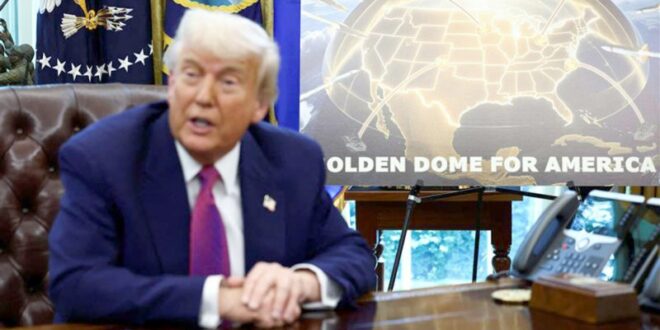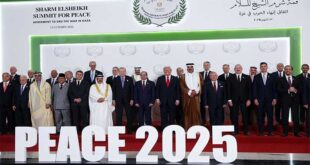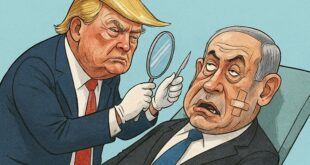
President Trump’s statements about nuclear testing affirm his determination to ensure that the United States maintains the most powerful nuclear arsenal in the world.
Last week, President Trump announced that “because of other countries[’] testing programs,” he had “instructed the Department of War to begin testing our nuclear weapons on an equal basis.” In the days that followed, headlines shouted: “mushroom clouds on the horizon,” “Trump doubles down on Nuclear Tests,” and “US nuclear weapons tests can forever scar a nation.” Amid the hype, many in the media struggled to decipher what the president could have in mind.
Critics make a living taking his words and imagining the worst. However, when interpreting President Trump’s statements, one should begin with Peter Thiel’s insight. As Thiel put it way back in 2016: “…the media is always taking Trump literally. It never takes him seriously, but it always takes him literally…I think a lot of voters who vote for Trump take Trump seriously but not literally.” Trump speaks in hyperbole—his unique combination of fact, fiction, and fantasy.
So, how should we understand Trump’s recent threat to resume nuclear testing? How seriously should we take press claims that the United States is on the verge of exploding nuclear weapons—something that has not been done since 1992 and would violate the Comprehensive Nuclear Test Ban Treaty that it championed, which has constrained Russia, China, and others from detonating nuclear weapons?
My answer is: not much. Informed observers know that there are many ways countries “test nuclear weapons” to ensure that they have a credible deterrent. Test launches of missiles, like the one the United States carried out at Vandenberg Space Force Base in California this week, ensure that our delivery systems remain reliable, ready, and accurate. As part of our Stockpile Stewardship Program, the Department of Energy’s National Nuclear Security Administration (NNSA) carries out tests, experiments, and simulations weekly to ensure our nuclear warheads work as intended should they be needed.
Furthermore, tests go far beyond our missiles and warheads. The United States also regularly tests its nuclear command and control systems. For example, last April, when the Air Force carried out a test of its airborne nuclear command and control system, it ensured that the United States has a reliable second-strike capability.
Unlike the alarmists who have been the loudest voices touting President Trump’s tweet, when asked about this issue, the professionals in charge of managing our nuclear weapons have been reassuring. At his confirmation hearing last week, President Trump’s nominee to become the future STRATCOM commander—the individual responsible for America’s nuclear arsenal—was asked about the safety, security, and reliability of our nuclear arsenal.
Vice Admiral Richard Correll, who is currently the Deputy STRATCOM commander, responded crisply: “I have absolute confidence that those systems will perform wherever we need them to perform.” Similarly, when asked about the possibility of resuming nuclear testing last Sunday, President Trump’s Secretary of Energy Chris Wright asserted, “the tests we’re talking about right now are system tests. These are not nuclear explosions.”
President Trump’s comment has excited interest in some parts of the US government and expert community about the possibility that he could authorize “super-critical tests.” The official position of former administrations has been that these are prohibited by the Comprehensive Test Ban Treaty. However, because the terms of the treaty are somewhat ambiguous on this point, Russia and China have both interpreted it in a manner that has allowed them to conduct super-critical tests—and they have done so.
This may have been what President Trump was referring to in an interview with 60 Minutes last week, when he said, “They test way underground where people don’t know exactly what’s happening with the test. You feel a little bit of vibration. They test and we don’t test.” Advocates of nuclear testing argue that engaging in equivalent tests could provide new, valuable information on the effectiveness of the US arsenal.
For perspective on Trumpian hyperbole on nuclear weapons, it is useful to recall his earlier stance on what he termed “denuclearization.” In the first month of his second term, he said, “We want to see if we can denuclearize.” And, in August, he said, “One of the things we’re trying to do with Russia and with China is denuclearization.”
After one of his meetings with Putin, he speculated about the possibility of a deal with Putin on “denuclearization.” To the national security community, “denuclearization” means the elimination of current nuclear arsenals—an extreme position. However, it is one that, at times, a number of credible statesmen have supported, including President Reagan and former Secretaries of State George Shultz and Henry Kissinger.
Careful readers of what Trump has said on this topic, however, will see that what he has in mind is “arms control.” In other words, this includes agreements that limit the number and type of nuclear weapons, without eliminating them altogether. Particularly since the last strategic nuclear arms control treaty—the New START Treaty negotiated by Obama—is scheduled to expire next February, Trump may be hinting that he wants a deal with Putin that would allow both nations to live within the terms of the treaty for another year in the hope they can work toward a new arms control agreement.
As I argued in this publication last August, despite his often imprecise rhetoric, Trump has a better understanding of nuclear perils than any other political leader on the national or international stage today. As he has frequently asserted, he really believes that “nuclear weapons are the biggest problem we have.” With this in mind, my advice is: when listening to the president talk about nuclear issues, and even more when reading shrill claims about his words in the press, take Trump seriously—but not literally.
About the Author: Graham Allison
Dr. Graham Allison is the Douglas Dillon Professor of Government at Harvard University, where he has taught for five decades. Allison is a leading analyst of national security with special interests in nuclear weapons, Russia, China, and decision-making. Allison was the “Founding Dean” of Harvard’s John F. Kennedy School of Government and, until 2017, served as Director of its Belfer Center for Science and International Affairs, which is ranked the “#1 University Affiliated Think Tank” in the world.
 Geostrategic Media Political Commentary, Analysis, Security, Defense
Geostrategic Media Political Commentary, Analysis, Security, Defense





